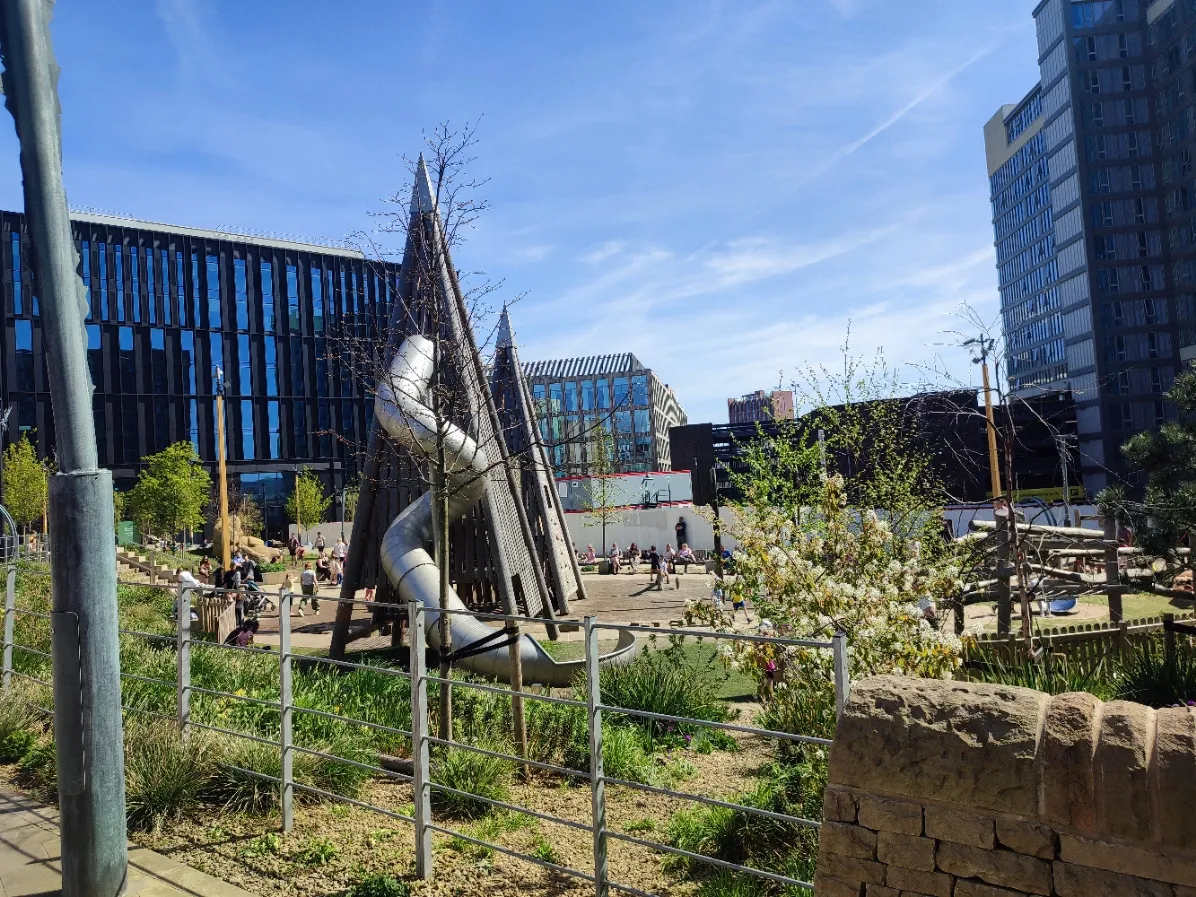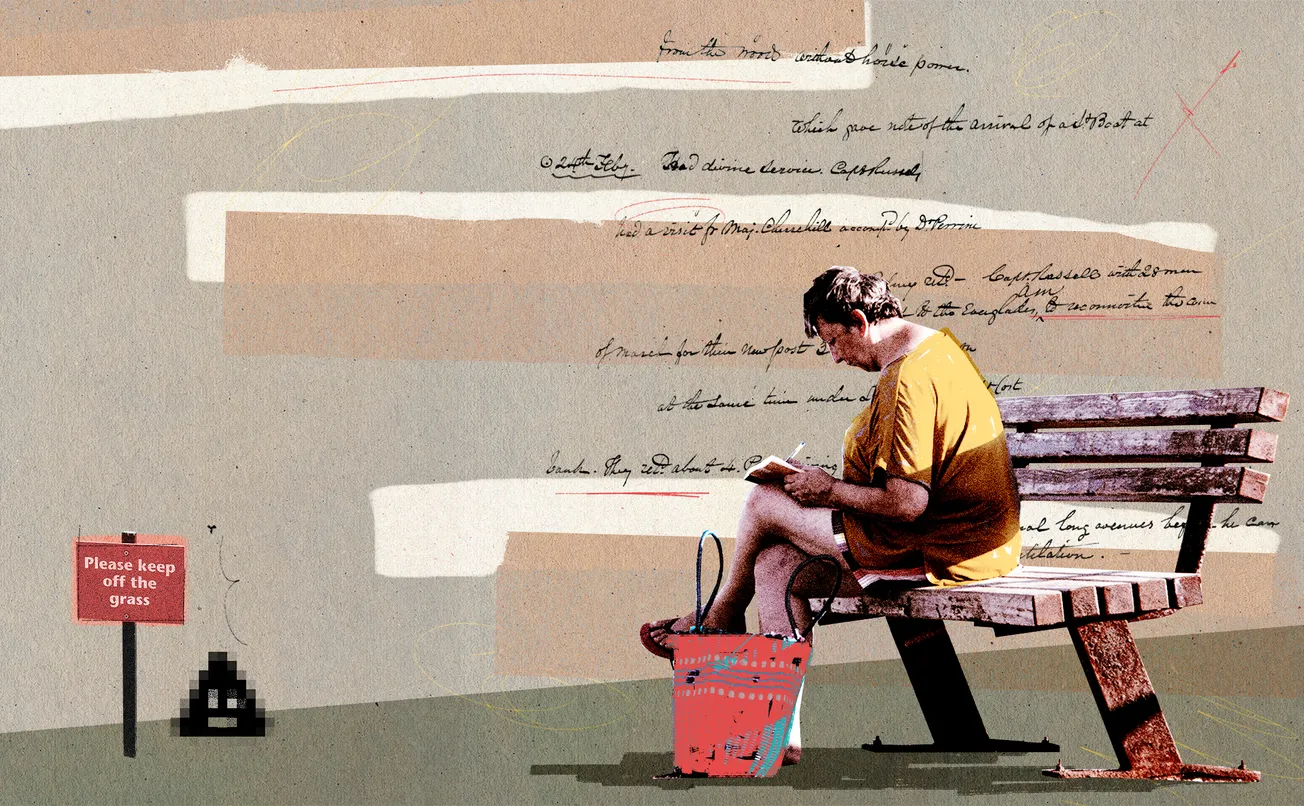The 1994 documentary Tales from a Hard City opens on a blank screen, soundtracked by an extraordinary voice. “Some of these days,” the voice sings, “you’re going to miss me, honey.” The camera tracks across to reveal a woman, whose face is spot-lit: she’s sporting enormous spectacles, her hair is greying. As the voice crescendos, we accompany a twenty-something man as he threads his way through Sheffield tower blocks.
The man heads into a flat, where the singing woman, Kath, is now sat knitting. We later discover that he is the singer’s son and the content of the conversation should be unpleasant: he’s pressing her for money, she’s refusing to give him any. But the young man, Glen, has a charm that softens the hard edges of the subject matter. An innate tenderness and humour between them emerges.

“You’ve got some coin left then?”
“I ain’t got a dime.”
“You’re joking?”
“Not a cent!”
“You’re joking?”
“I’m not joking.”
“So you’re skanking me?”
She begins to laugh, tickled despite herself. “I’m not skanking you.”
“You’re skanking me!”
“Well, I made up my mind. You’re going to have to stand on your own two feet.”
Tales from a Hard City could have been a sort of interesting curiosity. The premise is a decent one: it follows four people in Sheffield in the ’90s as they try to make it big in the entertainment industry. Glen is out of work, but his current profession, as he tells a karaoke show presenter, is “thief” — what he really wants to do, though, is become a singer. Paul is a former boxer in hot pursuit of an acting career. Sarah is a twenty-something single mother whose “provocative dancing” in a bar when she was on holiday in Greece meant she landed in jail there for a few days — something which was reported by the papers back home.
She’s now trying to use this notoriety as a springboard to become a pop star: a quest Wayne, her manager, is abetting her in. Even based on this enjoyable premise, if the characters hadn’t been engaging, this film could have felt bland. But there’s a profoundly watchable quality to each of the quartet that means the documentary has become a cult classic. Plus, despite the hardship threaded through the film — with most of the leads struggling to make ends meet — it is enormously funny.

The Independent on Sunday called it “The greatest Mike Leigh comedy that Leigh never made.” It boasts a gaggle of pop star fans: Badly Drawn Boy has apparently watched it over 100 times; Tales producer Alex Usborne tells me he’s heard from mutual friends that Jarvis Cocker is a big fan; Mogwai programmed the film at their All Tomorrows Parties weekend event. It won the Grand Prix at the prestigious Vue sur Les Docs film festival in Marseilles.
But despite all the film’s accolades, when I wanted to delve deeper, I found there was very little written on this documentary. So how was it created? What inspired it? And what was it like being in front of the camera?
I spoke to Kim Flitcroft, the film’s director, and Alex, via phone. The pair met at the National Film School in 1987, where Alex was producing graduation films when their paths crossed. At the time, Alex — who hails from Sheffield — was besotted with the work of the writer Geoffrey Beattie, who was writing pieces about Sheffield which were later collected in the book Survivors of the Steel City (“articles about floozies and gangsters”, according to Alex) which made a big impression on the producer.

“I went up to the boxing gyms and the moment I walked into one, my life changed. There were stories and grit and soul. I spent a bit of time with Geoffrey, he took me out at Josephine's Nightclub and that was a big start.”
Kim and Alex went on to make two films about boxers in Sheffield, Johnny Fantastic and Brendan's Boys. There was a moment at the end of Brendan’s Boys, Alex tells me, when he and Kim were standing outside Brendan Ingle’s Gym in Wincobank looking out across the Lower Don Valley and he told Kim this was where his father used to work when he was an engineer, but there didn’t seem to be any steel being made down there anymore. Instead, they were building Meadowhall shopping centre.
“We clocked that the city was in a really interesting moment of change,” Alex says. “Industry was over but the council had this strategy for regeneration to do with shopping and leisure and sport. It just felt absurd that you could replace 200 years of industry with media and shopping and leisure and these very transparent and ephemeral things — it felt really panicky and not thought out and rather comic.”

They resolved to look for stories about this peculiar moment in time in the city and secured seed money from Channel 4, plus further funding from the French/German channel ARTE and Yorkshire TV to do so. If you're working for a TV company, Kim explains, normally the priority is getting a film made and edited as quickly as possible. “But we didn't want to do that, so we spent six months filming this, running around Sheffield meeting people, finding people that we liked to film with.”
Alex and Kim started hunting for a cast of possible characters at the gyms: familiar territory from their previous films. They already knew Paul from his former boxing career, and came across Glen messing around with his friends on the punchbags at one of the gyms. Aspiring talent manager Wayne contacted them and he was already promoting Sarah, which was how they met her. There was even an additional cast of characters who fell by the wayside as shooting continued: “They dropped out, so we were making it up as we went along. Again, it's not something you'd ever be able to do today. It's a kind of period piece,” Kim says.

Kim was 38 and Alex was 30 by the time they started shooting Tales, but there’s something innately youthful about the documentary that can’t entirely be attributed to the age of the performer leads, who are all in their twenties. The documentary gives me the same sensation that being very young once did. My teenage years were not exactly a thrill ride: I hung about in shopping centres, greying parks, eked out hours in friends’ bedrooms, nothing ever happened, but equally, nothing could dissuade me. I’d head home only with enormous reluctance: something amazing was about to happen; I was about to be transformed forever.
The three performers are all poised on the brink of — what? Something. Aspiring pop star Sarah can’t sing, but she’s got stage presence. Paul cannot drive, but this doesn’t stop him from putting himself forward to a car dealership, arguing they should lend him a car since he believes he is a future celebrity: his self-certainty is infectious. Glen thinks he can coax a singing career out of past karaoke successes, which would be funny-ha-ha if it wasn’t for his charisma.

One compelling piece of the puzzle is how wildly un-self-conscious the characters seem before the camera, something Kim ascribes to him shooting in an age before social media and before reality TV, “in which real people are scripted and cajoled into performances.” He argues that people reacted differently to cameras back then, and this is self-evident on watching it! Sarah asks Glen what he thinks of her performance that night and he tells her, with an earnestness that only hits when you’re three pints into a night out, “I admire your body, I really do.”
A self-appointed image consultant Anton trails black actor Paul around and tells his musician friend he would like to act as a mirror for Paul. This results in a discussion of race in the entertainment industry, with the musician arguing “With respect, we don’t need a white person to be our mirror.” Wayne tells Sarah his groin is rubbing up against her during a photoshoot, something Wayne tells me via phone was him just “getting carried away” and being “theatrical.”
Wayne says at the time, he owned a few different bars in Sheffield and that for him, getting involved was a publicity opportunity. He enjoyed himself tremendously and claims he knew what he was in for “but I think that I made myself look a bit silly at times. One or two of my friends were ashamed of me. Younger people were great about it, but my friends weren't too impressed with me.”

When I ask Kim if any of this was prompted by him, he tells me he didn’t give his cast any instructions, he “was just present, sticking [his] camera in their faces, letting them do what they wanted to do.” The one exception to this, he concedes, was the car sponsorship scene with Paul — this had already happened when there were no cameras around and he asked him to re-stage it. Alex argues that although they were making it up as they went along, from early on, he and Kim had a sense that comedy would be at the heart of the documentary. “Funnily enough, we were also watching quite a lot of soap opera, which was very unfashionable at the time in documentary and we liked that sort of soap opera storytelling.”
Besides the unfiltered quality, one of the great joys of the film is the strong sense it gives you of ’90s Sheffield. Much of the action takes place in Josephine’s Nightclub, which Kim tells me felt like the centre of the universe at that time. They would often go along a few times a week and wait for their cast to show up. Alex says there was something magical about Josephine’s back then: “Everyone was drinking champagne and there was this sense of it being like the south coast of France but actually we were in Sheffield.”

Making the documentary may have been fun, but like any film project, the hours were long. Plus, there was the odd minor mishap - when Kim lent Glen a camera so he could keep a video diary, it soon vanished. He phoned Kim up to tell him he’d pawned the camera: he had no money for a gas bill.
Kim ended up thanking Glen: after all, he had a good network for selling things but he’d opted to pawn the camera instead. “We got it back from the pawnshop but we didn't do any more video diaries with him.” Even today, Alex feels the end result was worth the effort: “Sometimes you just hit something that is magic, it's about a moment in time and the spirit of the characters. They don't know what they're doing, they haven't really got the full toolkit, but bloody hell, they're going to do it.”
Partly, I started this piece out of curiosity: What happened to the cast? Wayne went on to own a string of sandwich shops in York, and found fame after they developed the YorkyPud Wrap — turkey, beef, ham or pork wrapped in a Yorkshire pudding with vegetables, stuffing and gravy — effectively a handheld roast dinner.
He also started a commercial radio station in York and claims to still have the same enthusiasm for life that was evident in the documentary. He lost touch with Sarah shortly after filming ended, when he felt that she had other things on her mind and couldn’t focus, making their working relationship feel a bit one-sided.” Wayne is ashamed he seemed so gushing about her on-screen — “I did know that Sarah wouldn't make it, I wasn't stupid” — but attributes his ostensible enthusiasm for her career as him going with the flow of the documentary.

Neither Kim nor Alex know what happened to Sarah, having also lost touch with her. Alex retained contact with Paul for a while, seeing him every few months, but says “It’s a difficult story. I think he probably had a little bit of a battle with mental health.”
It’s silly to root for one person over another — all of the cast are deeply charming and watchable — but part of me hoped most of all that Glen would have somehow pulled it off and become a singer. Perhaps this is because the documentary makes him seem the most financially precarious of the performer trio. In one scene, Glen gets a letter from Sheffield Magistrates’ Court with a final reminder about paying a £453 fine, summoning him to court. If he doesn’t pay it, he’ll have to serve 28 days in prison. He takes inspiration from his troubles to write and record a song about the ordeal facing him. But it’s hard to feel as breezy about his prospects as he seems to.
When I ask how he’s doing, Kim hesitates for a moment before telling me Glen passed away a few years ago. He gives me Glen’s mother Kath’s number — the woman who the documentary opens on. It is not a perfect interview: the line isn’t good and I have the sense Kath is hard of hearing.

I can hear the TV in the background in her living room and someone goes to turn it off. 27 years later, Kath still speaks with the same velvet hush that I remember from Tales. She grows animated when I ask her about Glen: “He got up to all sorts of mischief, he was a rogue. He was! But you'd be surprised how many people put things on Facebook when it's his birthday. Last time I think there were 105 who posted. He was a very popular person.”
She tells me Glen had problems with drugs and used heroin, though he also had periods of sobriety. Glen would eventually die as a result of health problems relating to his alcoholism. When he was sober, he worked in a factory and as a bin man. But “a career in singing” was his real goal, Kath tells me. “That's what he always wanted. He used to come in, he'd start getting upset, and [I'd say] Glen, don't worry, something will work out for you. But it didn’t.”

Kath enjoyed being part of the documentary, especially in terms of getting to work on a project with her son. One night, Glen had come home and asked her if she wanted to be in a film: Alex had asked him if there was anyone else with talent in his family and he’d suggested Kath. Alex had asked Glen if he thought his mother would mind if he asked her to sing — “And he says, I shouldn't think so! She sings all the time, night and day.”
Kath backs up Glen’s assessment: she sings “anywhere, anytime” and if the opening scene is anything to go by, she does so beautifully. When the film came out, Alex and Kim would ask her to sing the Sophie Tucker song the documentary opens on in person before each Sheffield performance. But sometimes she ventured further afield: She treasures the memory of the time the musician Badly Drawn Boy hired a cinema in Manchester to do a screening of the film and she and Glen went along. She tells me Badly Drawn Boy told her that he’d hired the cinema under the proviso that she came too: he wanted to hear her sing.
At the end of the screening, Kath tells me the whole audience stood up and there was clapping and cheering.
“I thought bloody hell, that’s for me, that’s the whole place. A working class estate girl — not bad is it? Not many have made a film.”
Alex and Kim have kindly agreed to make Tales From A Hard City available for free on Vimeo for six months following the publication of this article. You can watch it here.

Comments
How to comment:
If you are already a member,
click here to sign in
and leave a comment.
If you aren't a member,
sign up here
to be able to leave a comment.
To add your photo, click here to create a profile on Gravatar.







